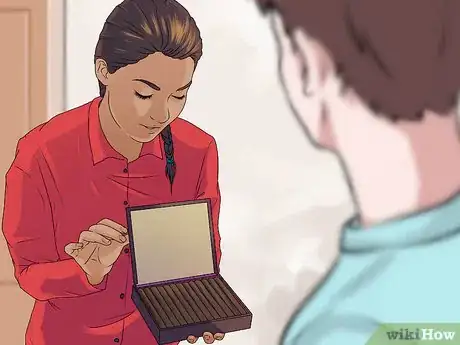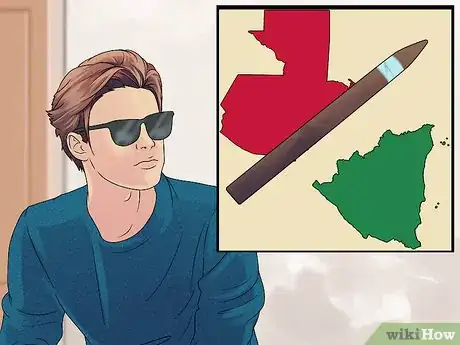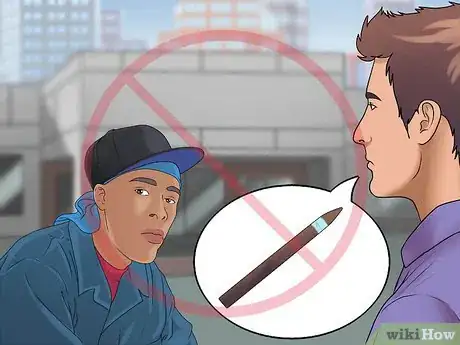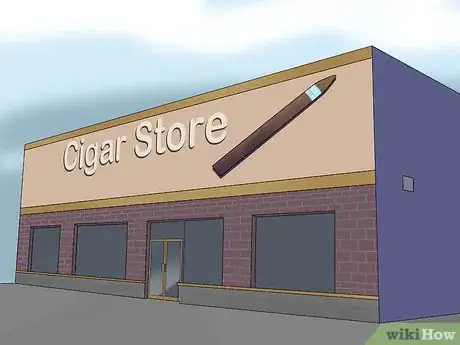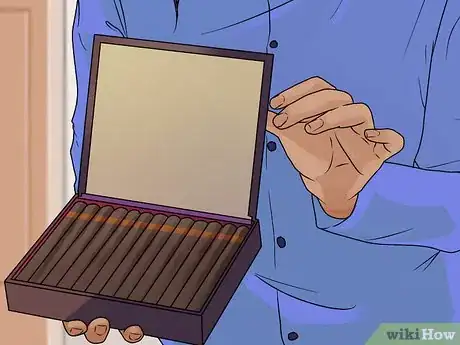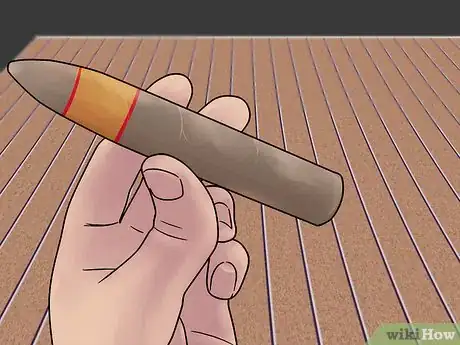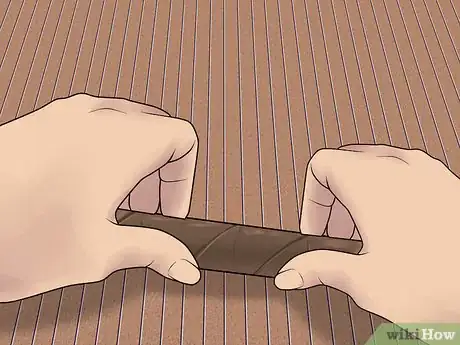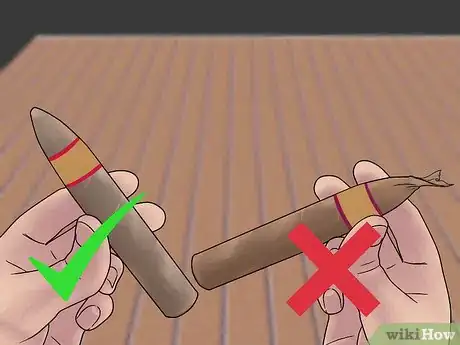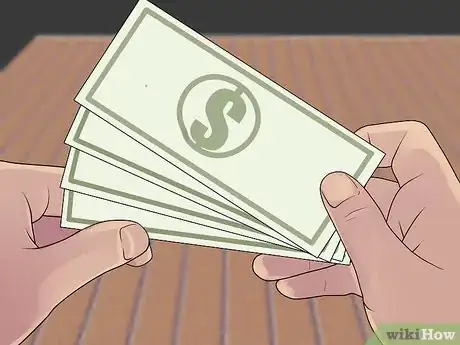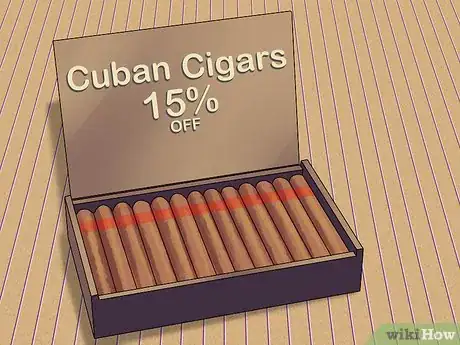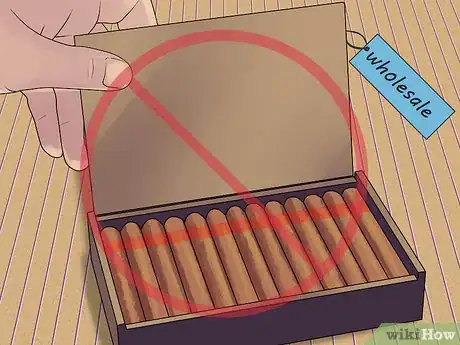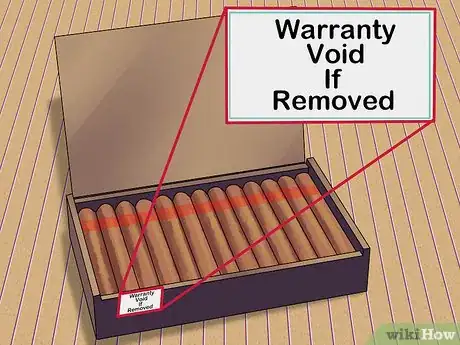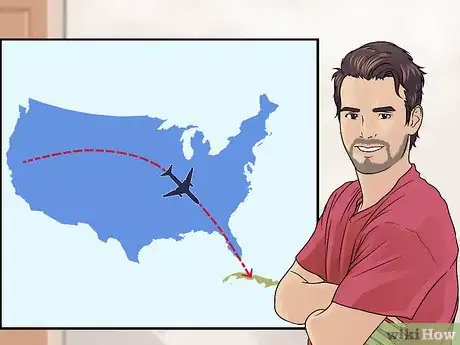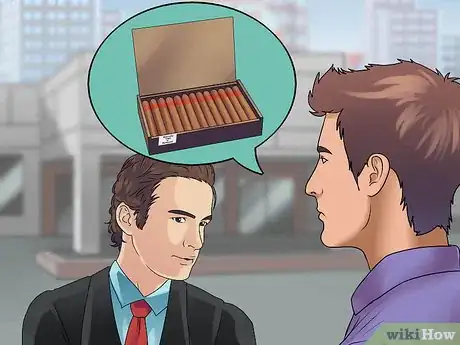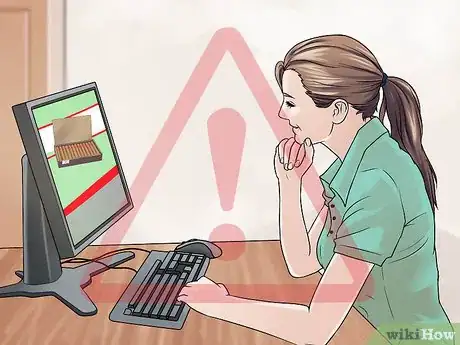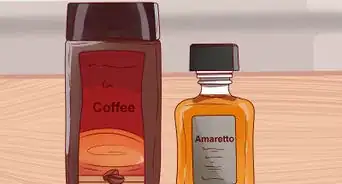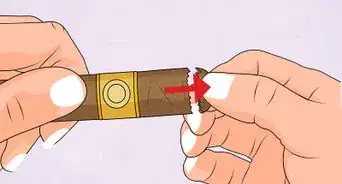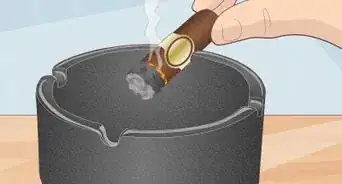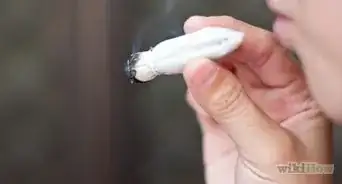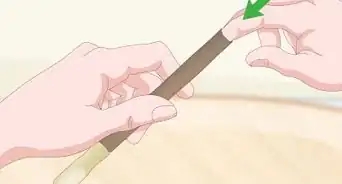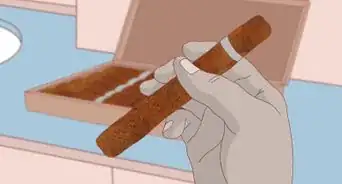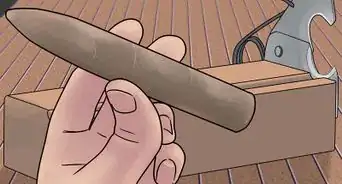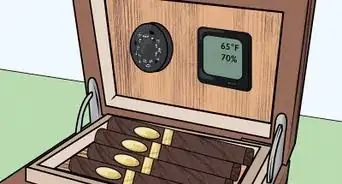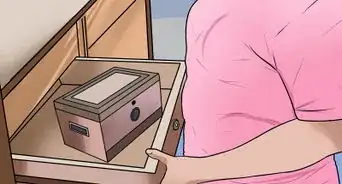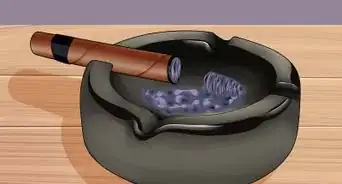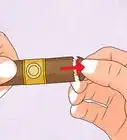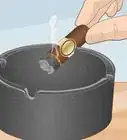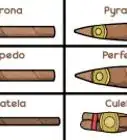This article was co-authored by wikiHow Staff. Our trained team of editors and researchers validate articles for accuracy and comprehensiveness. wikiHow's Content Management Team carefully monitors the work from our editorial staff to ensure that each article is backed by trusted research and meets our high quality standards.
There are 12 references cited in this article, which can be found at the bottom of the page.
This article has been viewed 66,695 times.
Learn more...
As cigars have regained popularity in recent years, the number of places where you can buy authentic, top quality Cuban cigars has increased. So, too, have less scrupulous vendors selling cheap imitations. Fortunately, you don’t have to be a cigar aficionado to be able to tell the difference between the genuine article and a lackluster knock off. All you need is a keen eye, a little preliminary research and the ability to spot flaws in inferior products.
Steps
Finding Reputable Cigar Vendors
-
1Only buy Cuban cigars from licensed vendors. When searching for a place to buy authentic Cuban cigars, check out whether or not the storefront advertises that they’re licensed to sell official Cuban tobacco products. Top-tier brands like Habanos, Cohiba and Romeo y Julieta will almost always be found in high-end stores, not on a flimsy convenience store rack. In some cases, vendors will carry certificates of authenticity and other documentation that what they’re selling is legitimate.[1]
- You’ll rarely find Cuban cigars with prestigious brand names in a bodega, quick-stop or curio shop. Seek out businesses that specialize in fine tobacco.
- Ask the salesperson to show you a certificate pointing out the legitimacy of the cigars they’re selling, or credentials for carrying a particular brand.
-
2Take your location into account. As a rule, the further you are from Cuba (with the exception of the United States), the less likely you are to find real Cuban cigars. Tobacco is one of Cuba’s top exports, but due to long-standing bans and embargoes on Cuban products, the chances of finding a genuine Montecristo or Bolivar in a faraway place is slim. You may be able to turn up Cuban cigars in places that trade openly with Cuba, like Guatemala, Nicaragua or The Dominican Republic, but even these should be inspected to verify their authenticity.[2]
- As of 2016, it is legal to bring a limited number of cigars (up to $100 worth) back into the United States from Cuba, but they cannot be sold within the US. There also still exist numerous restrictions on where certain Cuban products can be bought and how much can pass through Customs.[3]
Advertisement -
3Never buy cigars on the street or out of someone’s home. As a tourist, you should never buy a cigar being sold by someone on the beach, at a street kiosk or out of someone’s apartment room. These are almost always fakes. In some cases, workers who roll the cigars at the factories will sell imitations marketed as the real thing, but these are filled and rolled with leftover scraps of tobacco, and can be unpleasant or even dangerous to smoke. Stick to tobacco stores selling licensed goods, or places like hotels that double as official vendors.[4]
- Just as you wouldn’t expect to buy an actual Rolex from someone with a blanket of watches laid out on the sidewalk, you should be skeptical of cigars being passed off as legitimate in dubious locations or places where tourist traffic is high.
-
4Look for stores near the factory. Most cigar factories will have stores nearby that sell their products, if not inside the factories themselves. This is the best place to start looking. Tobacco parlors in the vicinity of where Quinteros are rolled, for instance, are more likely to sell genuine Quintero cigars. As you move away from the place of origin, you begin taking your chances more and more.[5]
- While you’ll be able to find real cigars skirting around the factories where they’re rolled, there will also be an abundance of imitations. For this reason, you’ll also want to learn how to spot fake individual cigars yourself.
- If you’re on the hunt for Cuban cigars outside of Cuba, play it safe and track down a licensed establishment.
Inspecting the Cigars for Quality
-
1Examine the packaging closely. Real Cuban cigars will be sold in a tightly sealed, sturdy box bearing a few distinct markings. One is the official Habanos seal, which is a technically-complex holographic image, in upper right corner of the box. There will also be a pale green Cuban warranty seal wrapping around the lefthand side, which has been meticulously designed and printed to discourage counterfeiters. The bottom of the box will feature a heat-printed stamp reading “Habanos, S.A.” and “Hecho en Cuba,” along with essential details like a code identifying the factory where the cigars were rolled and the date they were packaged.[6] [7]
- Imitations are often sold in boxes with transparent glass or plastic lids. These peculiar lids are designed to satisfy you with a view of the product inside while keeping you from taking too close a look. Real cigars will always be sold in solid boxes that must be opened to view the cigars inside.
- Keep an eye out for spelling and grammatical errors, cheap printing methods, peeling stickers, and warped, damaged or flimsy boxes. Counterfeiters usually don’t go to the trouble of reproducing the quality standards of the packaging.
-
2Take a look at the band. The band enclosing the cigar itself is one of the most telling indicators of authenticity. Official cigar bands will be printed with the highest quality materials, and are often holographic or embossed to make them immediately recognizable. Phony cigars will be banded with cheap stickers, usually dull in color and missing the sophisticated elements that characterize authentic cigars.
- The bands on fake cigars are often much larger than the bands on real ones, in the hopes of drawing the buyer’s attention to the brand name and away from the cigar itself.
- Different cigar manufacturers print different unique bands, but all are made with painstaking attention to detail. Use common sense. If it doesn’t have the impressive flair of a real cigar band, it probably isn’t.
-
3Inspect, feel and smell the cigars. If given the opportunity, take a cigar out of its box and put it to the test of your senses. Look to see if the color of the wrapper leaf is a rich, uniform light brown. Squeeze the cigar to feel if it’s firm all the way through. Most importantly, smell the ends of the cigar. If it doesn’t have a rich, complex aroma, you can bet that it isn’t what it claims to be.[8] [9]
- The inferior tobacco leaves used to wrap cheap cigars are brittle and prone to cracking, splitting and crumbling. They will also often be inconsistently colored, with a faded or mottled appearance.
-
4Learn to spot subtle differences. Imitation cigars are often made with extravagant extra touches or careless mistakes. You won’t find an authentic Cuban cigar with a braided or “Barber Pole” wrapper (alternating layers of dark and light colored leaves), or one that has been rolled with anything but Habanos-seed leaves. Counterfeiters also don’t typically have the means to replicate certain pressing features of the cigar, such as the straight-cut, flattened “foot” end. These types of nuances are subtle, but may help you differentiate between a good cigar and a shabby fabrication.[10]
- A fake cigar will produce a bright white ash when it’s lit, whereas a real cigar will glow softly and leave a dark gray ash.
Making Sure You're Buying the Real Thing
-
1Be prepared to pay a lot. When it comes to superior craftsmanship, you get what you pay for. The same is true for top-of-the-line Cuban cigars. Sure, you could get by spending $8-$10 per cigar from a vendor on the street, but an imitation cigar won’t have the complex flavor notes and rich, smooth feel of the genuine article. For a quality Cuban, you can expect to pay anywhere from $25 to $50 per cigar.[11]
- Cuban cigars are expensive, even in Cuba. Contrary to the idea that they’re cheaper there because they’re more common, the makers of Cuban cigars know that their products will fetch a high price. They also understand that people will pay more for the experience of smoking a great cigar.
- If you live in the United States, the recent lifting of the trade embargo with Cuba will make it possible for you to bring home real Cuban cigars, but only up to $100 worth. In most instances, this will only get you 3-4 good cigars.[12]
-
2Beware of special discount offers. Because of how exquisitely made they are, Cuban cigars are always sold at full price. If you run into a pitch advertising any sort of discount offer on cigars of renown like Partagas or Cohiba, chances are you’re being conned. These second-rate fabrications may indeed be rolled using tobacco and materials from the factories they claim, but they will basically be comprised of scraps and won’t be exemplary of real Cuban cigars.[13] [14]
- Unlike other commercial goods, cigars are considered specialty craftsman goods, much like fine foods and aged liquor. It is rare that you will find these types of goods sold for less than what they’re worth.
-
3Never buy cigars “wholesale.” In addition to suspect markdowns, it’s rare for Cuban cigars to be sold in exceptionally large quantities. Each box of cigars will typically only be filled with between 10 and 20 cigars. You can be assured that packages identifying themselves as Punch or H. Upmann that contain 30 or more cigars, or that are being sold in batches at wholesale prices, are less than legitimate. Once again, if an offer seems too good to be true, it probably is.[15]
- Wholesale deals are often made to unsuspecting tourists to trick them into thinking they’re getting more for their money. Don’t be fooled by these types of scams.
- Due to their price point, Cuban cigars are often bought individually. Only people with a lot of money will be able to purchase an entire box of cigars at once, let alone multiple or suspiciously large boxes.
-
4Identify government-mandated markings. In recent years, new security measures have been introduced by the Cuban government to discourage counterfeiting. These include a light green Warranty Seal and unique bar code wrapping around the left hand side of the box, a unreproducible holograph on the upper right corner and an official surgeon general’s warning. All are made using unique synthetic materials and processes that aren’t easily replicated. Look for these features before agreeing to pay for a box of cigars. If the stickers on the box look like they have been forged or tampered with, you may be dealing with fakes.[16]
- Forged Warranty Seals and other stamps and stickers will usually appear cheaply made, have misspellings and lack any sophisticated security indicators like holographic images.
- Never buy a cigar or box of cigars if any of the adhesive components appear to have been broken, removed, replaced or applied carelessly.
Buying Cuban Cigars as a US Citizen
-
1Acquire credentials for a trip to Cuba. Since diplomatic relations have been reopened with Cuba, it's now possible for US residents to travel to the island nation. However, these trips require special licensing, and are only possible under certain provisions. If you happen to be a journalist, trade expert or humanitarian, or if you're visiting family, you get a free pass, but at the moment, cultural tourism is only allowed via expensive and highly-controlled group tours. If you're determined to bring back authentic cigars from Cuba yourself, this may be your most feasible option. Just be prepared to have your entire trip mapped out for you.[17] [18]
- For certain people, their work may permit them to engage in travel and exchange with Cuba. Some of these professions include journalism, political diplomacy, education, humanitarian aid, historical and cultural research and specialty medicine.
- Updated government sanctions only permit $100 worth of tobacco and alcohol products to pass through Customs on the way back to the United States. This equals a meager 2-3 quality Cuban cigars.
-
2Buy Cuban cigars from importers in third-party locations. It is possible to track down Cuban cigars in places other than Cuba. Another consequence of the relaxed international trade agreements with Cuba is that tobacco products can be legally sold in third-party countries like Britain, Canada and Mexico. That means that if you happen to be on a business trip to Montreal or vacationing in Cancun, you can easily find and purchase genuine Cuban cigars, no questions asked. Look for vendors and duty-free shops in these places and bypass the headache of dealing with Cuban travel regulations.[19]
- The Habanos company manages the importing and exporting of brand-name Cuban cigars. You can often find stores licensed to carry cigars with the Habanos seal in major international cities.[20]
-
3Be wary of ordering cigars online. You might be able to find specialty tobacco websites advertising Cuban cigars for sale, but take caution when ordering from these places. It is still technically illegal to important anything into the US from Cuba without the proper say-so. Offenders risk being fined hundreds of thousands of dollars and even being tossed in jail for flagrant unlawful transactions. That hardly seems worth it for a couple hundred dollars worth of artisan cigars.[21]
- Importing Cuban goods to the US must be done under the watchful eye of Customs agents and demands that you adhere to a specific set of legal guidelines.
- When ordering online, there's also no way of knowing whether what you're buying is real or imitation.
Warnings
- It is still currently illegal in the US to order Cuban cigars over the internet.⧼thumbs_response⧽
- Fake cigars that have been rolled in unknown conditions may contain dangerous chemicals, debris or bacteria that are hazardous to inhale.⧼thumbs_response⧽
- Due to international laws, you may have a difficult time finding authentic Cuban cigars outside of Cuba.⧼thumbs_response⧽
References
- ↑ http://www.businessinsider.com/cuban-cigars-guide-havana-2015-7
- ↑ http://www.mensjournal.com/food-drink/collection/the-new-rules-for-buying-cuban-cigars-20141222
- ↑ http://observer.com/2014/12/6-cuban-cigars-youll-want-to-buy-when-the-embargo-lifts/
- ↑ http://nypost.com/2014/12/22/how-to-spot-a-real-cuban-cigar-from-a-fake-one/
- ↑ http://www.cigaraficionado.com/webfeatures/show/id/16209
- ↑ http://www.cigaraficionado.com/webfeatures/show/id/16124
- ↑ http://www.businessinsider.com/cuban-cigars-guide-havana-2015-7
- ↑ http://www.businessinsider.com/cuban-cigars-guide-havana-2015-7
- ↑ http://www.cigaraficionado.com/webfeatures/show/id/16124
- ↑ http://www.cigaraficionado.com/webfeatures/show/id/16124
- ↑ http://www.npr.org/sections/thetwo-way/2014/12/18/371675130/6-things-you-should-know-about-cuban-cigars
- ↑ http://www.mensjournal.com/food-drink/collection/the-new-rules-for-buying-cuban-cigars-20141222
- ↑ http://www.cigaraficionado.com/webfeatures/show/id/16124
- ↑ http://nypost.com/2014/12/22/how-to-spot-a-real-cuban-cigar-from-a-fake-one/
- ↑ http://www.cigaraficionado.com/webfeatures/show/id/16124
- ↑ http://www.habanos.com/en/verificacion-de-autenticidad/?age-verified=ceb326288a
- ↑ http://time.com/money/3639721/cuban-cigars-legal/
- ↑ https://money.com/cuba-travel-new-policy/
- ↑ http://www.cigaraficionado.com/webfeatures/show/id/a-legal-way-to-smoke-a-cuban-cigar-18689
- ↑ http://www.habanos.com/en/empresa/
- ↑ http://time.com/money/3639721/cuban-cigars-legal/
